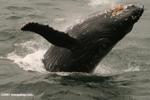Amazon Japan, a subsidiary of Amazon.com, pulled all whale meat products (and possibly dolphin meat) from its site after a new report by the Environmental Investigation Agency (EIA) and the Humane Society International highlighted the issue. Last December the organizations recorded 147 whale products on sale at Amazon Japan despite an international whaling moratorium since 1986. Japan, along with Iceland and Norway, continues to industrially hunt whales. Japan says their whale hunt is for scientific purposes only, but environmentalists dispute this.
Products on Amazon Japan included fin whale (Balaenoptera physalus) and sei whale (Balaenoptera borealis), both listed as Endangered by the IUCN Red List; Byrde’s whale (Balaenoptera edeni), listed as Data Deficient; and minke whale (Balaenoptera acutorostrata), Least Concern. A third of the “whale meat” products did not list species—bucking Japanese law—highlighting the likelihood that some of the meat was dolphin. Many of the products originated from Taiji, Japan made famous in the documentary The Cove for the slaughter of whales and dolphin.
Consuming whale or dolphin comes with considerable health risks. Investigators with the EIA bought eight of the whale meat products to test them for mercury. Six of the eight products (75 percent) had mercury levels above Japanese government limits. One of the products had a mercury level of 20 parts per million, 50 times higher than the legal limit.
When contacted, a representative of Amazon.com simply said, “The items you referenced are not available for sale.”
In response to Amazon.com taking down the whale meat, EIA campaigner Clare Perry said, “We welcome Amazon’s action to remove whale products from its Japanese website but urge Amazon to confirm it will enact a company-wide ban on the sale of all products derived from whales, dolphins or porpoises.”
Related articles
87 marine mammals still eaten by people
(01/24/2012) Threats to marine mammals usually include climate change, drowning as by-catch, pollution, depletion of prey, but what about eating marine mammals? A new study in Biological Conservation finds that a surprising 87 marine mammals—including polar bears, small whales, and dolphins—have been eaten as food since 1990 in at least 114 countries.
How much is the life of a whale worth?
(01/16/2012) How do you end a decades-long conflict between culture and conservation? How do you stop a conflict where both sides are dug in? A new paper in Nature proposes a way to end the long and bitter battle over whaling: environmentalists could pay whalers not to whale.
Whaling talks break down: ban stays in place, yet whaling will continue

(06/23/2010) The International Whaling Commission (IWC), which was supposed to decide a way forward for whales over the next decade has ended without an agreement. Talks broke down, according to participants, because countries opposed to whaling and those that continue hunting and killing whales despite a ban on commercial whaling—i.e. Japan, Norway, and Iceland—have been unable to find enough common ground to pound out an agreement.







